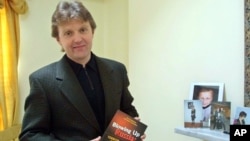Evidence that shows Russia was behind the 2006 murder of former KGB agent Alexander Litvinenko in London will mostly be given in secret, the chairman of a public inquiry into his death said on Thursday.
Kremlin critic Litvinenko, 43, died after being poisoned with a radioactive isotope in November 2006, a crime which from his death bed he blamed on Russian President Vladimir Putin. Russia has repeatedly denied any involvement.
Formally opening an inquiry into the killing at London's High Court, senior judge Robert Owen repeated his assertion that the British government held material which indicated the Russian state was responsible.
“The issues to which his death gives rise are of the utmost gravity and have attracted worldwide interest and concern,” said Owen.
It had been described to him as a “state-sponsored assassination” and “a miniature nuclear attack on the streets of London,” he said.
Anglo-Russian ties fell to a post-Cold War low in the wake of Litvinenko's death, particularly after British prosecutors said there was enough evidence to charge former KGB agents Andrei Lugovoy and Dmitry Kovtun with murder.
They were with Litvinenko at a London hotel when British police believe he was given tea poisoned with polonium-210. Moscow has refused to extradite them, and Lugovoy, who denied involvement, was later elected a lawmaker.
Relations between the countries improved after David Cameron became British prime minister in 2010, and his government had initially refused a request to hold a public inquiry.
The family of Litvinenko, who had been granted British citizenship, said the refusal had been made to protect business interests, and successfully challenged the decision in court, with judges ordering the government to reconsider,
Last week, with Anglo-Russian relations again at a low ebb after the downing of Malaysian airliner MH17 in a pro-Russian rebel-held part of Ukraine, Home Secretary [interior minister] Theresa May said there would be an inquiry after all.
Owen had originally been appointed as coroner to oversee an inquest into the death and suspended this on Thursday to allow the inquiry to begin instead.
Focus on Russian involvement
He said the allegations that the Russian state was culpable for the killing would be central to his investigation.
“HMG (government) material taken in isolation establishes a prima facie case that the Russian state was responsible for Mr Litvinenko's death - a view that I myself have subsequently endorsed,” Owen said.
He said the material was of “such sensitivity” that most could not be heard in public and said some of his findings would remain secret. But he promised he would make public his conclusions about Russian involvement.
However, the inquiry would not examine whether British spies carried out the killing or could have prevented it, he said, explaining there was no evidence to suggest the first claim or to indicate Litvinenko's life had been at serious risk.
Hearings ahead of the inquest also heard that Litvinenko had been working for Britain's Secret Intelligence Service, known as MI6, for several years.
A hearing to establish the format and other details of the inquiry will be held on Sept. 5, and Owen said it would begin in earnest in January next year.
“Finally we will know all about this crime,” said Litvinenko's widow Marina, who has fought a long battle to learn the truth behind the death.





